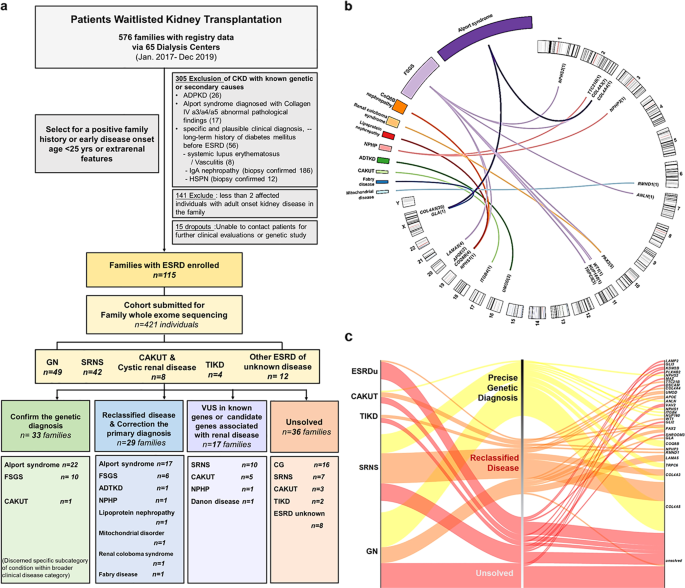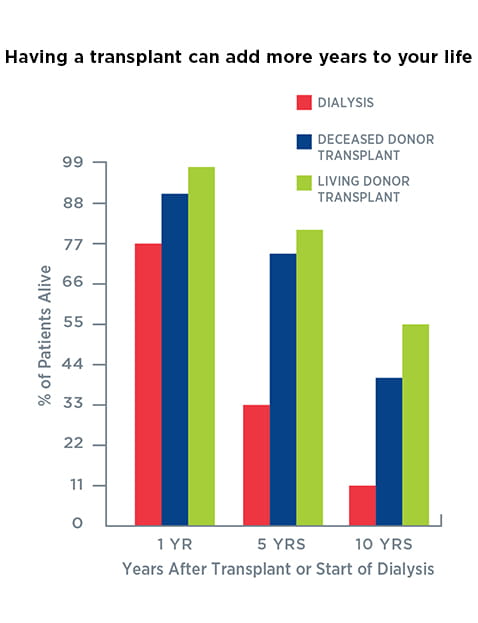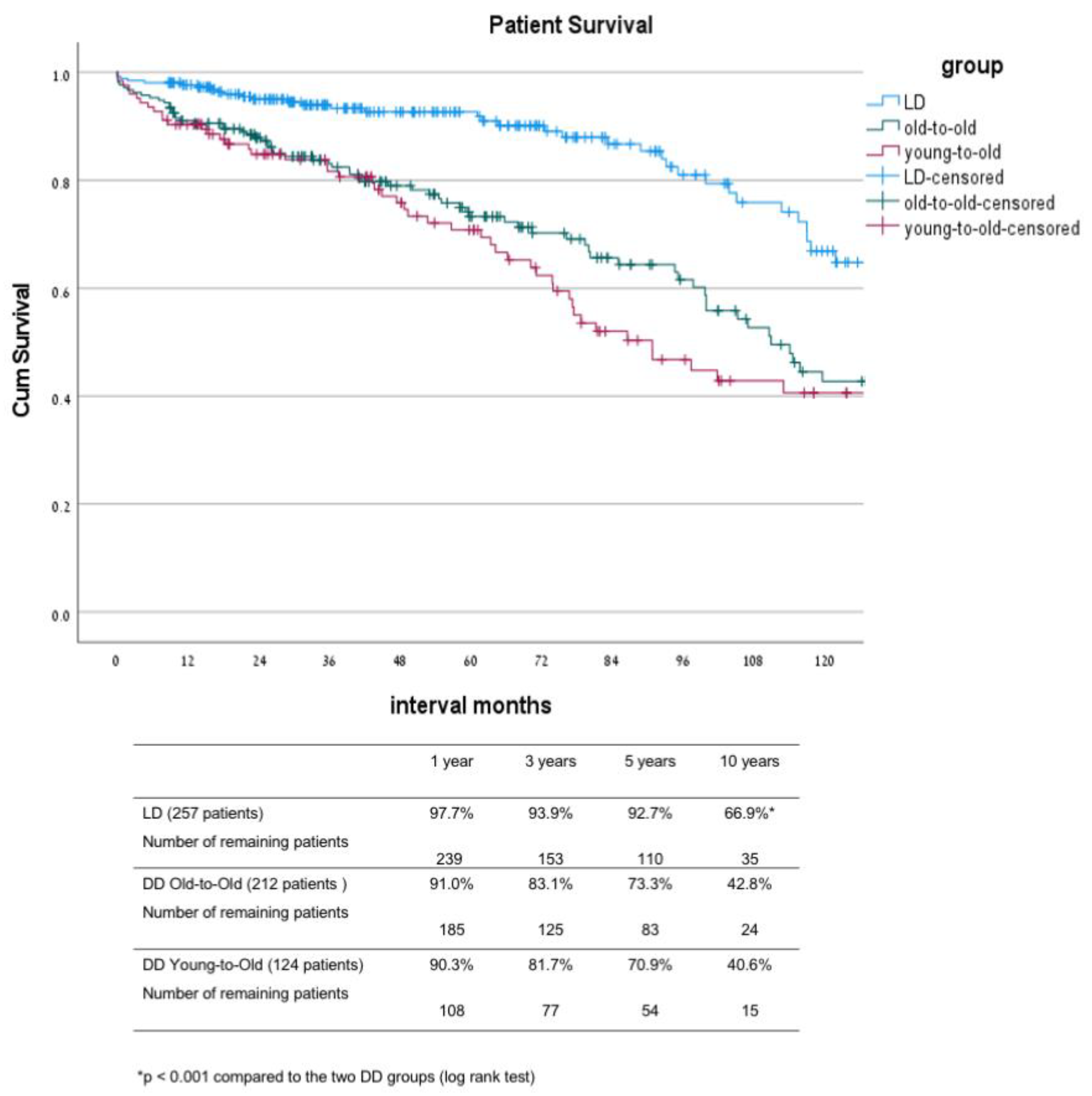child kidney transplant life expectancy
The life expectancy benefit of transplantation over. Your childs doctor may refer to this as kidney failure.

An Accessible Insight Into Genetic Findings For Transplantation Recipients With Suspected Genetic Kidney Disease Npj Genomic Medicine
Before your child can go home the transplant team will continue to provide care in the hospital for about one week though sometimes a longer hospital stay is needed.

. Patients in the age group of 40 or less may have a life expectancy of around 22 years after a kidney transplant. The goal of kidney transplantation in children is to provide a duration and quality of life similar to their healthy peers. 33 suggested that this period ranged between 100 and 200 days for ECD transplant recipients.
A living-donor transplant is when someone gets a kidney from a person who is still alive and well. Ty Dunn MD Surgical Director of Kidney and Pancreas Transplantation at Penn explains the difference in outcomes. People can live normal lives with only one kidney.
Ohio State is following 32 patients who were transplanted over 30 years ago including one living patient who received his transplant 44 years ago. 35 who compared the survival of kidney transplant recipients 70 years of age with age-matched wait-listed transplant candidates and. Once the kidneys stop working a transplant may be your childs best.
With the exception of routine visits with the kidney transplant team most children who have heart transplantations go on to live normal lives after the initial post-surgery period. Not many people live more than 10 years on dialysis. Overall graft survival is somewhat better when the kidney is.
When the kidney is removed the single normal kidney will increase in size to compensate for the loss of the donated kidney. On average kidney transplants may last for around 10-12 years. While in the hospital your child may have blood tests to check on their new kidney and be given medicines to help with pain.
Longest on record at Ohio State. The American Society of Transplantations guidelines state There should be no absolute upper age limit for excluding patients whose overall health and life situation suggest that. A deceased-donor transplant is when people donate their kidneys for transplant after they die.
Our Pediatric Kidney Transplant Program is one of the oldest and most experienced kidney transplant programs in the United States. However with increasing age such as with people in the age group of 50 the life expectancy goes down to 16 years and those in their 60s may have a life expectancy of 115 years after a successful kidney transplant. When a child is diagnosed with end-stage kidney disease it means that the kidneys have stopped working and waste is no longer being removed from the blood.
A study says 90 of people with transplant survive for at least 1 year and 70 of people may live for at least 5 years after transplant. More than 500 transplants have been performed in children and teenagers since 1964. It has been shown that kidney transplantation results in superior life expectancy and quality of life compared with dialysis treatment for patients with end-stage renal disease.
Our results are in contrast with those reported in the literature. However kidney transplantation in children differs in many aspects from adult kidney transplantation. The duration for which a transplanted kidney lasts may vary from person to person.
We Perform Hundreds Of Single Organ Dual Organ Transplant Procedures Annually. On the other hand I tell patients that they can expect on average 14 to 16 years of function from a kidney that comes from a living donor. One hot topic in the world of transplant has been what the appropriate cut off age should be for patients in need of a transplant.
Across the globe age criteria have been loosely defined. This can make a child sick. As long as the donor is evaluated thoroughly and cleared for donation he or she can lead a normal life after the surgery.
Half of children who have received transplants still have a functioning kidney graft 14 years after transplantation. Your transplant team will help you decide when you can go back to work. How soon you can return to work depends on your recovery the kind of work you do and your other medical conditions.
Helping kids with end-stage kidney disease return to normal life through kidney transplants is our goal. The improvement of your childs health after transplant can make a difference in your lifestyle although the first three months at least are still quite intense. Kidney transplantation and donation in children.
However with increasing age such as with people in the age group of 50 the life expectancy goes down to 16 years and those in their 60s may have a life expectancy of 115 years after a successful kidney transplant. How long transplants last. Life after transplant Recovery in the hospital.
Anyone who is thinking about a kidney transplant or recently had a kidney transplant should consider the physical emotional and lifestyle changes that can come with it. Its usually from a relative or close friend but sometimes strangers donate. Physical exercise is healthy and good for you.
Ad Schedule An Appointment With Our Leading Transplant Institute Team. Patients in the age group of 40 or less may have a life expectancy of around 22 years after a kidney transplant. A kidney transplant is done when the kidneys do not function properly.
Many people can return to work eight weeks or more after their transplant. On average most people who receive LT live for more than 10 years. Percentage Of Kidney Transplant Recipients Whose Transplants Failed By Download Scientific Diagram.
There are two kinds of kidney transplants depending on who donates the new kidney. Children will therefore need two or more kidney donations in their lifetime. Adjusting to life after kidney transplant Getting a kidney transplant can be an exciting life-changing event but caring for a new kidney can be a lot of work.
Unfortunately this means that the other half have returned to dialysis and require a second transplant during childhood or adolescence. Deceased donors 7-9 years. Living donors 10 to 13-year graft half-life.
Child kidney transplant life expectancy. More than 40 years. These results have been confirmed in a more recent study by Rao et al.
Many may live for up to 20 years or more after the transplant. On the other hand I tell patients that they can expect on average 14 to 16 years of function from a kidney that comes from a living donor.

Us Deceased Kidney Transplantation Estimated Gfr Donor Age And Kdpi Association With Graft Survival Eclinicalmedicine

Kidney Donor Shortage Impacts Children With Chronic Kidney Disease

Us Deceased Kidney Transplantation Estimated Gfr Donor Age And Kdpi Association With Graft Survival Eclinicalmedicine

5 Staggering Facts About Pediatric Kidney Transplants Montreal Children S Hospital

Living Kidney Donor Transplant Conditions Treatments Ucsf Health

Long Term Outcomes Of Kidney Transplantation In Children Pediatric Clinics

Compatible Pairs National Kidney Registry Facilitating Living Donor Transplants

Long Term Outcomes Of Living Donor Kidney Transplant Children Weighing Less Than 15 Kg Comparison Of The Surgical Approach Journal Of Pediatric Urology

Survival Rate Of Kidney Transplant Recipients Download Scientific Diagram

W Technique For Biliary Anastomosis In Liver Transplantation Liver Transplant Liver Health

Long Term Survival After Kidney Transplantation Nejm

Long Term Survival After Kidney Transplantation Nejm

Please Pass This On To Raise Awareness For Organ Donation Renal Failure Chronic Renal Failure Kidney Donation

Dialysis Vs Kidney Transplant Kidney Transplant Program Main Line Health

Relative Survival And Quality Of Life Benefits Of Pancreas Kidney Transplantation Deceased Kidney Transplantation And Dialysis In Type 1 Diabetes Mellitus A Probabilistic Simulation Model Shingde 2020 Transplant International Wiley Online Library

Jcm Free Full Text Long Term Results Of Kidney Transplantation In The Elderly Comparison Between Different Donor Settings Html

